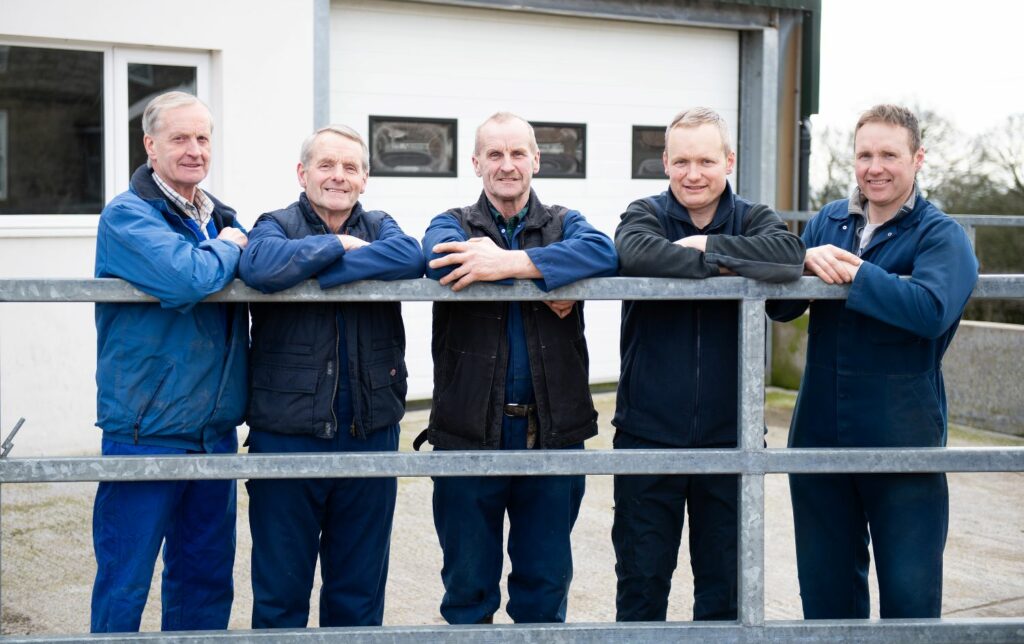Finalists announced for the 2022 NMR RABDF Gold Cup
19th December 2022
Five finalists have been announced for the 2022 NMR RABDF Gold Cup award, including two dairy businesses in Scotland and three from the south and southwest of England.

Gold Cup finalists 2022 Alex, Tom and Hugh Logan, who farm along with Tom’s sons, Alistair and Stuart
Finalists for the Gold Cup are chosen by a panel of judges after having completed a detailed form with information on their farming system, progress and business targets.
Following selection, the contestants proceed to an on-farm inspection, this year carried out by RABDF’s council members Di Wastenage and Peter Alvis and 2019 Gold Cup winner Robert Sloan.
The finalists who will be presenting their pedigree herds at this year’s Gold Cup are:
- Liz Birkett, Rookhaye Farm, Bowerchalke, Salisbury, Wiltshire
- Chris and Helen Ford, Peadon Farm, Fiddington, Bridgwater, Somerset
- Alistair Logan, Holehouse Farms, Kilbirnie, Ayrshire
- Andrew, Oliver & Wendy Reed, France Farm, Blackborough, Cullompton, Devon
- Stuart Orr, Messers George Orr, Kaemuir Farm, Avonbridge, Central Scotland
To qualify for the Gold Cup, herds must meet the competition’s criteria provided by their milk recording organisation, or be nominated from their discussion group or a company.
Minimum criteria for all herds include more than 100 cows/heifers in the milking herd, an annual average somatic cell count of 200,000 cells/ml or lower (250,000 cells/ml for organic herds), and a minimum PLI value specific to the breed or calving system.
The winner of the Gold Cup will be announced at Dairy-Tech 2023, on the NMR stand at 4pm Wednesday the 1st February, along with the winners of the Chris May award, the NMR Silver Salver, The Lilyhill Cup, and the Chairman’s Cup.
Meet the final five
Dairy farmer Liz Birkett, also a finalist in 2019, manages a mixed dairy and arable farming business in south Wiltshire. Through excellent breeding and nutrition and strict hygiene measures, Ms Birkett significantly improved the performance of her pedigree Holstein herd of 170 cows and followers.
“Improvements in herd performance, and particularly herd health, are largely down to our dairy team,” she said. “We’ve made improvements in the buildings in the past few years, but it’s the commitment and close involvement of the team that has made it all work. Our staff are our biggest asset.”
Looking into the future, Ms Birkett hopes to improve herd health and welfare further and allow the cows to express their full genetic potential.
Chris and Helen Ford are first-generation tenant farmers at the 275-hectare Peadon Farm in Somerset, and are seven years into establishing their high-performance pedigree Holstein herd. Consisting of 600 cows and 680 youngstock, the herd is housed all year round and has been closed since 2018.
Keeping such a large herd in top form is no small challenge, yet the Ford family aspires to be disease-free and is heavily invested in maintaining herd health and hygiene. “Our aim is to breed efficient, healthy, high yielding cows with good longevity that can produce 50,000 litres of milk over four lactations,” Mr Ford said.
Moreover, the Fords also regard forage-growing like growing arable crops and involve an agronomist in soil nutrition. As a result, they have been able to produce 41% of the total milk yield from grass and maize silage.
Meanwhile, technology and renewable energy are at the core of helping the fifth-generation Logan family from Ayrshire, Scotland, maximise health and welfare in their 280 pedigree Holstein herd.
Recent investment into calf housing has resulted in reduced disease pressure on the farm, with a low rate of antibiotics used across the herd of 16.09 mg/PCU. Moreover, the family is also forward-thinking in their approach to minimising the farm’s environmental impact.
“We are trying to make the most of the natural resources on the farm and provide another income to future-proof the farm,” Mr Logan said, referring to the various technologies used to generate renewable energy. The business has also invested in devices such as ear tag sensors and body condition scoring cameras to further increase efficiency.
Also shortlisted for the Gold Cup are finalists Andrew, Oliver and Wendy Reed, who have built up a strong reputation for producing quality breeding stock over the past 15 years. The family runs a 180 pedigree Holstein herd on their farm in Devon and calve around 220 animals per year, of which 140 are dairy and 80 beef cattle.
The many rosettes won over the years attest to the Reed family’s success in the show ring. Other than paying close attention to every aspect of herd management, the business works closely with consultant Janice Radford to ensure optimal use of resources.
“She works with us on all elements of the farm business and we wouldn’t be where we are without her,” explains Oliver Reed, adding they also carry our routine soil sampling with an agronomist to ensure nutrient availability for homegrown maize and grass silages.
Owing their success to a strict breeding and herd health programme, the last of the five finalists is the Orr family from Falkirk, Scotland. Their top-performing herd consists of 260 Holstein cows, with the best animals being put in calf to sexed semen to minimise unwanted black and white bulls.
From the start of this year, the family has performed routine genetic testing on all newborn calves and heifers. To improve the genetics of the herd, each cow is matched to the correct bull through the Genus genetic programme.
The Orr family also works closely with their farm vet, who carries out monthly herd health visits and routine procedures such as disbudding, castration, weighing and vaccinations. Implementation of a thorough health plan has resulted in reduced antibiotic use on farm and mastitis rates falling well below the national average of 50% (AHDB) at just 8%.
